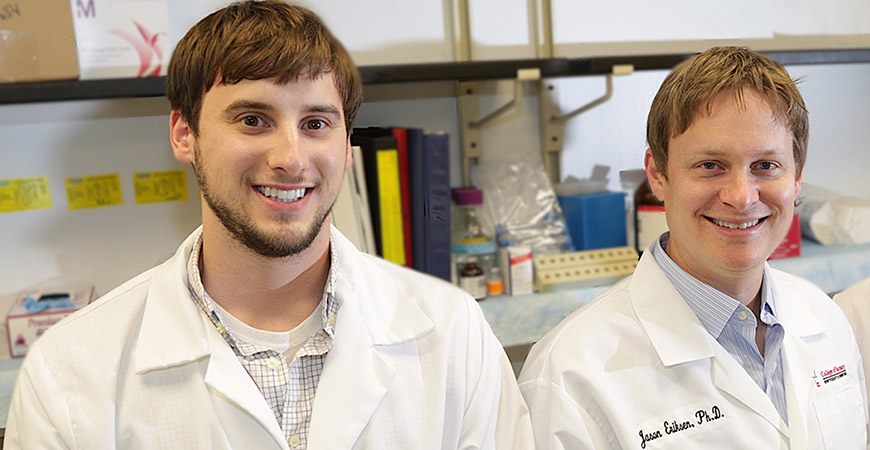Research News

Start-up Turns Heads
UHCOP Faculty, Student Startup Named Among 10 Most Promising Life Science Companies at 2016 Texas Life Science Forum
Teomics, a startup biotechnology company whose co-founders include a faculty member and a Pharmacology doctoral candidate at UH College of Pharmacy, was recognized among the Rice Alliance 10 Most Promising Life Science Companies at the 2016 Texas Life Science Venture Forum May 26 in Houston.
Teomics was co-founded in 2015 by UHCOP Associate Professor Jason Eriksen, Ph.D., and Pharmacology Ph.D. candidate Craig Vollert, along with Badrinath "Badri" Roysam, Ph.D., Professor and Chair of Electrical and Computer Engineering Department at UH Cullen College of Engineering and Willy Moree, Ph.D., a former UH research staff member.
Teomics has developed a new "antigen retrieval protocol" for reversing the chemical modifications by the commonly used formaldehyde solutions to preserve biopsy tissue sample before undergoing diagnostic imaging and analyses. The company's platform aims to provide more accurate detection of diseases, particularly with certain types of cancers that may be more prone to "false negative" results due to such factors as lower-expressing biomarker proteins and the chemical "masking" of proteins by formaldehyde.
The company currently has one U.S. patent pending, with additional patent applications through the University of Houston in progress, and plans to begin producing and marketing its technology by this fall. Teomics has received support from the UH Technology Gap Fund through the Office of the Vice President for Research and Technology Transfer, and Vollert has taken advantage of various entrepreneurial programs at UH and Houston, including RED Labs and the Cougar Venture Fund at Bauer College of Business.
Although the company is initially focused on the cancer diagnostics market, the co-founders believe their formaldehyde-scavenging compounds have broader application to advance disease detection and research using current diagnostic probes but also salvage untapped probes deemed ineffective.
Eriksen and Vollert pointed to a 2015 survey by The Scientist that indicated over 75 percent of researchers are replacing failed antibodies on a routine basis and a global marketplace with revenue of $1.6 billion and growing.
"The award provides further validation and support for the Teomics platform and our technology's market potential," Vollert said. "We're moving forward on several fronts to prepare for the start of production and deployment, including continued discussions with prospective investors, conducting additional market research, and setting up our office and lab space."
Held at the BioScience Research Collaborative at Rice University, the Texas Life Science Venture Forum is hosted by the Rice Alliance for Technology and Entrepreneurship, BioHouston, and the Texas Healthcare and BioScience Institute.
More than 50 startup companies presented their three-minute business plan presentations at the forum, and an additional six Nasdaq-listed life science companies provided status updates. The event is one of the largest life science venture capital conferences in the Southwest and featured more than 40 industry and investment speakers, with venture capitalists and other investors, entrepreneurs, industry representatives, business leaders and service providers among the approximately 500 attendees.